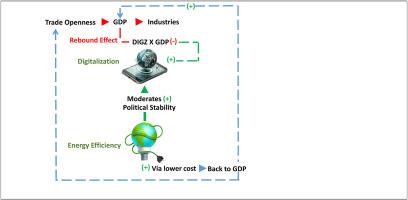通过数字平台解锁能源效率:对可持续能源转型的影响
IF 9.1
1区 工程技术
Q1 ENERGY & FUELS
引用次数: 0
摘要
尽管人们对数字化与能源效率之间关系的兴趣日益浓厚,但在新兴经济体中,关于数字化与能源效率之间关系的经验证据和概念框架仍然有限。这项研究调查了从1990年到2022年的22个国家。它采用矩分位数回归(MMQR)方法来分析数字化和关键的经济、结构和制度因素如何影响能源效率。MMQR框架支持跨不同分位数的分布分析。结果表明,数字化显著提高了能源效率,这在很大程度上是由数字基础设施和技术采用的进步所推动的。GDP、产业结构、贸易开放度和城市化降低了能源效率,而政治稳定提高了能源效率。总体而言,该研究为数字化在提高能源效率、支持这些新兴经济体的数字化和脱碳转型方面的作用提供了强有力的实证证据。本文章由计算机程序翻译,如有差异,请以英文原文为准。

Unlocking energy efficiency through digital platforms: Implications for sustainable energy transition
Despite growing interest, empirical evidence and conceptual frameworks on the nexus between digitalization and energy efficiency remain limited in emerging economies. This study investigates 22 countries from 1990 to 2022. It employs the Method of Moment Quantile Regression (MMQR) to analyze how digitalization and key economic, structural, and institutional factors influence energy efficiency. The MMQR framework enables a distributional analysis across different quantiles. Results show that digitalization significantly promotes energy efficiency, largely driven by advancements in digital infrastructure and technology adoption. In contrast, GDP, industrial structure, trade openness, and urbanization reduce energy efficiency, while political stability enhances energy efficiency. Overall, the study provides robust empirical evidence on the role of digitalization in enhancing energy efficiency, supporting digitalization and decarbonization transitions in these emerging economies.
求助全文
通过发布文献求助,成功后即可免费获取论文全文。
去求助
来源期刊

Renewable Energy
工程技术-能源与燃料
CiteScore
18.40
自引率
9.20%
发文量
1955
审稿时长
6.6 months
期刊介绍:
Renewable Energy journal is dedicated to advancing knowledge and disseminating insights on various topics and technologies within renewable energy systems and components. Our mission is to support researchers, engineers, economists, manufacturers, NGOs, associations, and societies in staying updated on new developments in their respective fields and applying alternative energy solutions to current practices.
As an international, multidisciplinary journal in renewable energy engineering and research, we strive to be a premier peer-reviewed platform and a trusted source of original research and reviews in the field of renewable energy. Join us in our endeavor to drive innovation and progress in sustainable energy solutions.
 求助内容:
求助内容: 应助结果提醒方式:
应助结果提醒方式:


